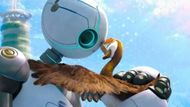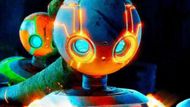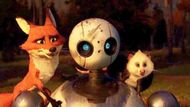The Wild Robot isn’t just a book—it’s an emotional journey that redefines what it means to feel. Adapted by Peter Brown into the magnificent 2024 animated film, The Wild Robot has become a contemporary classic beloved by children and adults alike. With its understated yet powerful story, it follows Roz, a robot who washes up on a remote island and embarks on a journey of unexpected motherhood, friendship, and self-discovery.
What truly makes The Wild Robot unforgettable are the moments that linger long after the last page—or final scene. This story isn’t just about machinery and survival; it’s about what happens when technology collides with nature and discovers a soul. Through Roz’s journey, the narrative explores themes of love, loss, and identity through the eyes of a character who shouldn’t be able to care—but does.
From Roz’s bond with Brightbill to her connection with the island’s creatures, every emotional note lands with quiet, lasting force. As we revisit the seven most moving moments from The Wild Robot, get ready to relive the feelings you couldn’t shake—and probably never will.
Most heartfelt moments from Wild Robot that you can't get over with
1. Roz Adopts the Gosling, Brightbill

In a world where machines are ruled by reason, Roz’s maternal instinct shocks readers. When an accident leaves a solo gosling without a family, Roz is tasked with filling his mother’s shoes. Her choice isn’t generated by programming—it’s a reaction to the naked vulnerability she perceives. This is her first emotional revelation.
It was amplified in the 2024 animated remake by DreamWorks to be even more poignant, with discreet facial expressions and emotional cues that made robot-human empathy feel entirely possible on screen. This is where Roz’s transformation starts, preparing the audience for a story that will test the boundaries of family, purpose, and love.
2. Brightbill’s First Migration

Brightbill’s flight is a blow not only to Roz, but to readers who have come to love their relationship. Seeing her son fly for the first time is at once triumphant and a loss in the same moment. DreamWorks’ recent production captured this with swooping aerial shots and a poignant musical score that added depth to the emotional impact.
It’s an excellent metaphor for parenthood: raising, then releasing. Roz’s quiet observation is more compelling than any speech—a reminder that love is freedom, not possession. Brightbill’s departure is not merely a plot device; it’s a heart-rending moment of sorrow and self-knowledge.
3. Roz Faces Her Past on the Island

The island is not only Roz’s haven—it’s a reflection of the pieces that make her who she is. When Roz finds other wreckage of smashed crates and understands that her landing was intentional, a haze of enigma and sadness descends. Her identity quest strikes a stronger chord in the latest adaptation, where faint flashbacks and layout hints refer to her potential pre-coded feelings.
These introspective moments make Roz more human than any outward action. She is not merely surviving—she is questioning, growing. It is a personal exploration into the heart of a machine and challenges readers to consider: can beings without memory truly feel loss?
4. The Animal Community Accepts Roz

Roz begins as a stranger—not understood and not trusted by the native island inhabitants. Her gangly movements and mechanical being render her an anomaly. But gradually, through kindness—repairing houses, nursing sick creatures, and being deferential toward their traditions—she finds herself accepted by them.
The 2024 movie amplified this journey by presenting a colorful, multi-species cast of animals, each with unique voices and personalities that reflected their changing dynamic with Roz. Their ultimate embrace isn’t merely heartwarming—it’s a testament to persistence, understanding, and interspecies solidarity. It’s the kind of gradual change that makes the moment of togetherness feel rightful, powerful, and tear-jerking.
5. Roz Learning to Speak the Animal Languages

In a display of patience and devotion that is truly astonishing, Roz learns to comprehend—and ultimately communicate—the different animal languages of the island. It’s not accomplished by downloads or data uploads. She watches, imitates, and evolves. It’s a lesson in humility, one seldom assigned to robots.
In the 2024 film version, this metamorphosis is beautifully dramatized with shots of Roz struggling, then slowly syncing her voice to mimic chirps, growls, and squeaks. It’s heartwarming and universal at the same time.
Beyond communication, it represents Roz’s genuine attempt to be part of something. It’s a reminder that compassion requires effort—and that even machines can learn the language of the heart.
6. The Battle to Save Roz

The emotional peak of The Wild Robot hits when factory robots arrive to take Roz back. Rather than run, the animals stand up for her, forming a disorganized yet poignant standoff.
The 2024 version brought an additional visceral dimension: every creature—from the tiny chipmunk to the massive moose—stands together against the hard march of industrial power. It’s a David-vs-Goliath scenario with emotional stakes.
This is not just about rescuing Roz—it’s about fighting for the right to create one’s own family. Through their act of defiance, the animals prove that love, loyalty, and solidarity can overcome even the strongest forces of oppression.
7. Roz’s Bittersweet Farewell

The emotional climax comes when Roz sacrifices her own safety to leave the island and save her loved ones. It is a selfless act of heroism made even more wrenching by the real bonds she has formed.
The final scenes of the adaptation echo classic farewell sequences—silent, lingering, and heavy with emotional weight. Her parting with Brightbill, with no guarantee of return, is especially heartbreaking. It reflects real-world experiences with separation and the courage to face the unknown.
Roz doesn’t cry—she can’t. But readers do. This goodbye doesn’t feel like the end of a journey—it feels like the beginning of something intensely human within a machine.
The Wild Robot touches the heart in ways few stories do. Through Roz’s mechanical eyes, we experience love, sacrifice, and growth that feel deeply human. Each of these seven moments reveals something essential: that connection, empathy, and identity are not exclusive to humans—or even biological life.
Whether it’s a farewell, a word learned, or a hand extended in kindness, The Wild Robot reminds us that the truest emotions are often the quietest. These are the moments we can’t—and shouldn’t—get over.
Love movies? Try our Box Office Game and Movie Grid Game to test your film knowledge and have some fun!
